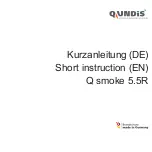
8
© 2012 Directed. All rights reserved.
Tach threshold On/Off
In most cases, this jumper can be left in the Off position. Some new vehicles use less than 12 volts in their ignition systems. The unit may have
trouble learning the tach signal in these vehicles. Changing the jumper to the On setting changes the trigger threshold of the digital tach circuit
so that it will work with these type vehicles.
Light flash (+) / (-) polarity
The jumper is used to determine the light flash output polarity. In the (+) position, the onboard relay is enabled and the unit outputs (+)12V on
the WHITE H1/11 wire. In the (-) position, the on-board relay is disabled. The White H1/11 wire will supply a 200mA (-) output suitable for
driving factory parking light relays.
Note:
For parking light circuits that draw 10 amps or more, the internal jumper must be switched to a (-) light flash output. P/N 8617 or a
standard automotive SPDT relay must be used on the H1/11 light flash output harness wire.
Transmitter/receiver Learn Routine™
The system comes with transmitters that have been taught to the receiver. The receiver can store up to 4 different transmitter codes in memory.
Note:
When doing any programming with security features off, the horn function (feature menu 1
item 13) must be programmed as Siren function to get an audible confirmation from the unit.
If the learn routines have been programmed using the Bitwriter, they may have been locked. Before proceeding with reprogramming
the learn routines, they must be unlocked with the Bitwriter - this cannot be done manually with the control center button.
Note
:
The Bitwriter requires software v2.7. Bitwriters with date code of 6A or older require an IC upgrade (p/n 998M). Some Bitwrit-
ers with a date code of 6B do not require the IC upgrade, refer to Tech Tip # 1112
for more information.
The control center button, plugged into the blue port, is used for programming. There is a basic sequence to remember whenever programming
this unit: Door, Key, Choose, Transmit and Release.
1. Open a door.
2. Insert the key. Turn the ignition to the ON position. The heavy gauge pink wire must be connected.
3. Choose. Within 10 seconds, press and release the Control center button corresponding to the number of the desired function step listed
in the following table.
Once you have selected the function step, press the control center button once more and hold it. The LED flashes and the siren chirps to confirm
the selected functional step. Do not release the control center button.
Step
Function
1
Auto Learn Standard Configuration (default)
The auto learn configuration will automatically set up the remote button configuration.
Note:
You cannot change the configuration
of the remote control buttons.
2
Delete remotes: This feature will erase all remotes from the memory of the system. This is useful in cases when a customer’s remote
is lost or stolen.
Note:
Does not reset the programmed features of the system or reset the Virtual Tach setting.
3
Reset Features: This resets all the features of the system to the factory default settings.
Note:
Does not delete the remotes from the
system or reset the Virtual Tach setting.
4
Virtual Tach Reset: Deletes all previously learned values for Virtual Tach, and on the next remote start sequence the unit will begin
virtual tach initialization.
Note:
The “Zap” feature on the Bitwriter does not reset the Virtual tach setting.
4. Transmit. While holding the Control center button, press the button on the remote control. The siren chirps to confirm that the code
has been successfully programmed or the selected feature has been reset. It is not possible to teach a remote control button to the system
more than once.
5. Release. Once the code is learned, or the feature reset, the Control center button can be released.
You can advance from programming one step to another by releasing the Control center button and tapping it to advance steps and then
holding it.
If you want to program Step 3 after programming Step 1, release the Control center button, press it twice and release it to advance to Step
3. Then press it once more and hold it. The siren chirps three times and the LED flashes three times to confirm it is ready to receive the code
from the transmitter.
Learn Routine is exited if:
•
Door is closed.






































